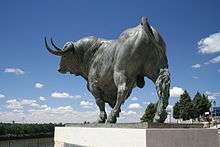Definify.com
Webster 1913 Edition
Bull
Bull
,And the bright
Bull
,Bull
,Bull
,Bull
,Webster 1828 Edition
Bull
BULL
,BULL
,BULL
, a prefix, signifies a bull, or large, or having a large head.Definition 2026
Bull
Bull
Luxembourgish
Etymology
From Old High German bolla, from Proto-Germanic *bullǭ. Cognate with German Bolle, Dutch bol, English bowl, Icelandic bolli.
Pronunciation
- IPA(key): /bul/
- Rhymes: -ul
Noun
Bull f (plural Bullen)
Synonyms
- (ball): Ball
bull
bull
English
Noun

bull (plural bulls)
- An adult male of domesticated cattle or oxen.
- Specifically, one that is uncastrated.
- A male of domesticated cattle or oxen of any age.
- An adult male of certain large mammals, such as whales, elephants and seals.
- A large, strong man.
- (finance) An investor who buys (commodities or securities) in anticipation of a rise in prices.
- (slang) A policeman.
- 1920, Mary Roberts Rinehart, Avery Hopwood, The Bat, chapterI:
- The Bat—they called him the Bat. […]. He'd never been in stir, the bulls had never mugged him, he didn't run with a mob, he played a lone hand, and fenced his stuff so that even the fence couldn't swear he knew his face.
- 1920, Mary Roberts Rinehart, Avery Hopwood, The Bat, chapterI:
- (Britain, historical, obsolete slang) A crown coin; its value, 5 shillings.
- 1859, J.C. Hotten, A Dictionary of Modern Slang, Cant, and Vulgar Words
- Half-a-crown is known as an alderman, half a bull, half a tusheroon, and a madza caroon; whilst a crown piece, or five shillings, may be called either a bull, or a caroon, or a cartwheel, or a coachwheel, or a thick-un, or a tusheroon.
- 1859, J.C. Hotten, A Dictionary of Modern Slang, Cant, and Vulgar Words
- (Britain) Short for bullseye.
- (Philadelphia, slang) A man.
Synonyms
- (slang: male person): guy, dude, bro, cat
- (slang: policeman): cop, copper, pig (derogatory), rozzer (British). See also Wikisaurus:police officer
Antonyms
- (finance: investor who buys in anticipation of a rise in prices): bear
Coordinate terms
Translations
|
|
|
|
Adjective
bull (not comparable)
- Large and strong, like a bull.
- (of large mammals) adult male
- a bull elephant
- (finance) Of a market in which prices are rising (compare bear)
Synonyms
Antonyms
Translations
Verb
bull (third-person singular simple present bulls, present participle bulling, simple past and past participle bulled)
- (intransitive) To force oneself (in a particular direction).
- He bulled his way in.
- (intransitive) To lie, to tell untruths.
- (intransitive) To be in heat; to manifest sexual desire as cows do.
- (Britain, military) To polish boots to a high shine.
- (finance, transitive) To endeavour to raise the market price of.
- to bull railroad bonds
- (finance, transitive) To endeavour to raise prices in.
- to bull the market
Translations
Derived terms
Etymology 2
From Middle English bulle, from Old French bulle, from Low Latin bulla.
Noun
bull (plural bulls)
- A papal bull, an official document or edict from the Pope.
- A seal affixed to a document, especially a document from the Pope.
Translations
Verb
bull (third-person singular simple present bulls, present participle bulling, simple past and past participle bulled)
- (dated, 17th century) to publish in a Papal bull
Etymology 3
From Middle English bull (“falsehood”), of unknown origin. Possibly related to Old French boul, boule, bole (“fraud, deceit, trickery”). Popularly associated with bullshit.
Noun
bull (uncountable)
Synonyms
- (nonsense): See also Wikisaurus:nonsense
Translations
Verb
bull (third-person singular simple present bulls, present participle bulling, simple past and past participle bulled)
- to mock, cheat
Etymology 4
From Old French boule (“ball”), from Latin bulla (“round swelling”), from Proto-Indo-European *bhel (“to blow, to swell”).
Noun
bull (plural bulls)
- (16th century, obsolete) a bubble
Catalan
Noun
bull m (plural bulls)
- the agitation of a liquid which is boiling
- effervescence
- a type of pork sausage
Related terms
- bullir v
Verb
bull
- third-person singular present indicative form of bullir
- second-person singular imperative form of bullir
French
Pronunciation
- IPA(key): /byl/
Etymology
From bulldozer.
Noun
bull m (plural bulls)
- (construction) bulldozer